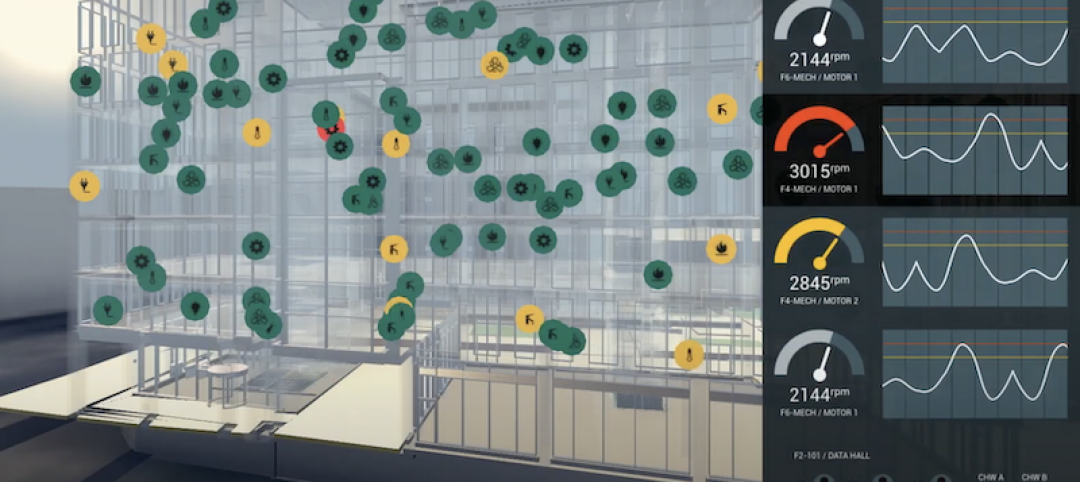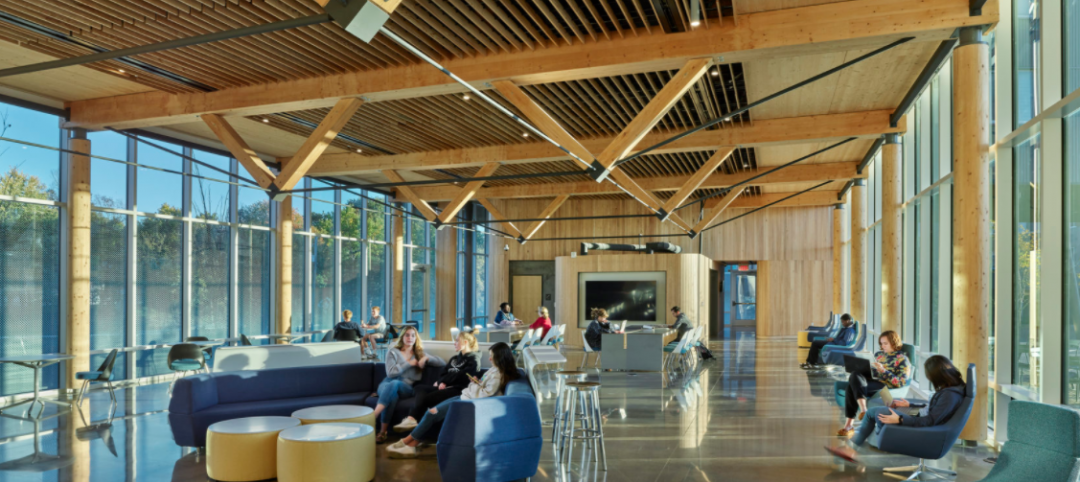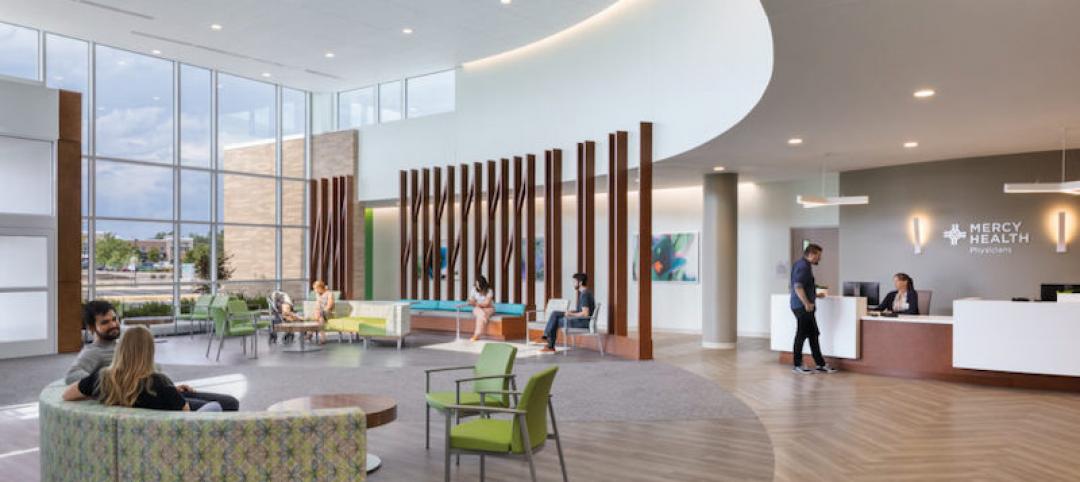Designed by Chicago architect Jarvis Hunt and constructed in 1903, Building 13 is one of 39 structures within the Great Lakes Historic District at Naval Station Great Lakes, Ill. The original boathouse, considered a “contributing structure with major significance,” reflects the Beaux Arts vocabulary and classical forms that Hunt applied to his work (1902-1911) at the Naval Station campus.
After more than a century of use, however, the building envelope, brick, terra cotta, windows, and roof were in sore need of repair, even as the Navy was seeking to expand the function of the nearly 27,000-sf boathouse to support year-round marine activity of the Great Lakes harbor with the addition of shops, classrooms, offices, toilets, and showers. However, any renovation had to be done within the strict guidelines of the Secretary of the Interior Standards for Rehabilitation, the National Historic Preservation Act, and the Base Exterior Architecture Plan (BEAP).
The design-build team, led by Chicago firm Johnson Lasky Architects, took on the structural problems more or less from top to bottom. Visual and physical inspections, materials testing (including brick and mortar analyses), and soundings on each individual terra cotta unit were conducted.
The roof was replaced with shingles over three-inch polyiso ventilated nail base insulation panels. Forty-year asphalt shingles rated for 110 mph wind loads were used to meet the BEAP’s historic requirements. New copper gutters, flashings, and terminations were installed.
At the turn of the 20th century, terra cotta was used as a mass-produced alternative to carved stone, and Hunt made extensive use of it in Building 13. Damaged terra cotta was replaced with new matching material from California manufacturer Gladding McBean. Brick was salvaged from Navy supplies of matching historic brick. Mortar was replicated based on an analysis of existing original material. New exterior doors replicated the original wood panel design. The glass transom above the main entrance door was fitted with laminated glass.
Windows were completely restored off site; missing glass was replaced with glazing that matched the original in texture, thickness, and type (“wavy”) to meet state historical preservation standards.
With the building now providing year-round use, it was necessary to upgrade the mechanical system to forced air, with an air handler, ductwork, controls, and other equipment. The Building Team solved this problem by housing a new mechanical room between two existing mezzanines on opposite sides of the building within the warehouse.
In granting the project a Gold Award, the jury praised the Building Team’s attention to detail. “They had to tackle a lot of different components: brick, terra cotta, the windows, etc.,” said K. Nam Shiu, PE, SE, VP at Walker Restoration Consultants, Elgin, Ill. “This was a labor of love. It doesn’t look like any corners were cut,” said Tom Brooks, VP, Restoration Division, Berglund Construction, Chicago. “Instead of remove and throw away, they chose to remove and restore,” said George Tuhowski III, LEED AP, Director of Sustainability and General Superintendent, Leopardo Construction, Hoffman Estates, Ill.
Judge Darlene Ebel, Director, Facility Information Management, University of Illinois at Chicago, called it “a good restoration, with good sustainability. The building still fits in with the whole area.” BD+C
* Note: Walker Johnson, FAIA, recused himself from the proceedings during the judging of this entry.
PROJECT SUMMARY
Building Team
Submitting firm: Johnson Lasky Architects (architect)
Owner: Naval Station Great Lakes
Environmental design: EDI, Inc.
Structural engineer: AHG Structural Engineering
MEP/fire protection engineer: KJWW Engineering
GC: Boaz Friedler Joint Venture
General Information
Area: 26,900 gsf
Construction cost: $5 million
Construction time: May 2007 to August 2009
Delivery method: Design-build
Related Stories
Multifamily Housing | Jun 3, 2021
Student Housing Trends 2021-2022
In this exclusive video interview for HorizonTV, Fred Pierce, CEO of Pierce Education Properties, developer and manager of off-campus student residences, chats with Rob Cassidy, Editor, MULTIFAMILY Design + Construction about student housing during the pandemic and what to expect for on-campus and off-campus housing in Fall 2021 and into 2022.
Architects | Jun 2, 2021
Two new practice leaders appointed at FGM Architects
FGM Architects appoints Jan Behounek to lead Higher Education and Scott Nall to lead Federal Practice.
Building Technology | Jun 1, 2021
Orro Announces Google Nest Integration for the Orro Switch
Orro, creators of the professional-grade top-of-the-line Orro Smart Living System, today announced the integration of Nest products to Orro. As a certified partner in Google’s Device Access program, this latest Orro integration allows homeowners to have seamless control and access to Nest thermostats and doorbells from any Orro Switch throughout the home – creating a single unified smart home system with advanced, intelligent ambient control.
High-rise Construction | May 27, 2021
The anti-high rise: Seattle's The Net by NBBJ
In this exclusive video interview for HorizonTV, Ryan Mullenix, Design Partner with NBBJ, talks with BD+C's John Caulfield about a new building in Seattle called The Net that promotes wellness and connectivity.
Digital Twin | May 24, 2021
Digital twin’s value propositions for the built environment, explained
Ernst & Young’s white paper makes its cases for the technology’s myriad benefits.
Senior Living Design | May 19, 2021
Senior living design: Post-COVID trends and innovations
Two senior living design experts discuss the latest trends and innovations in the senior living building sector.
Multifamily Housing | May 18, 2021
Multifamily housing sector sees near record proposal activity in early 2021
The multifamily sector led all housing submarkets, and was third among all 58 submarkets tracked by PSMJ in the first quarter of 2021.
Wood | May 14, 2021
What's next for mass timber design?
An architect who has worked on some of the nation's largest and most significant mass timber construction projects shares his thoughts on the latest design trends and innovations in mass timber.
Architects | May 10, 2021
Industry icon Art Gensler dead at 85
He was credited with creating a model for the modern, growth-oriented professional services organization.
Healthcare Facilities | Apr 30, 2021
Registration and waiting: Weak points and an enduring strength
Changing how patients register and wait for appointments will enhance the healthcare industry’s ability to respond to crises.

















